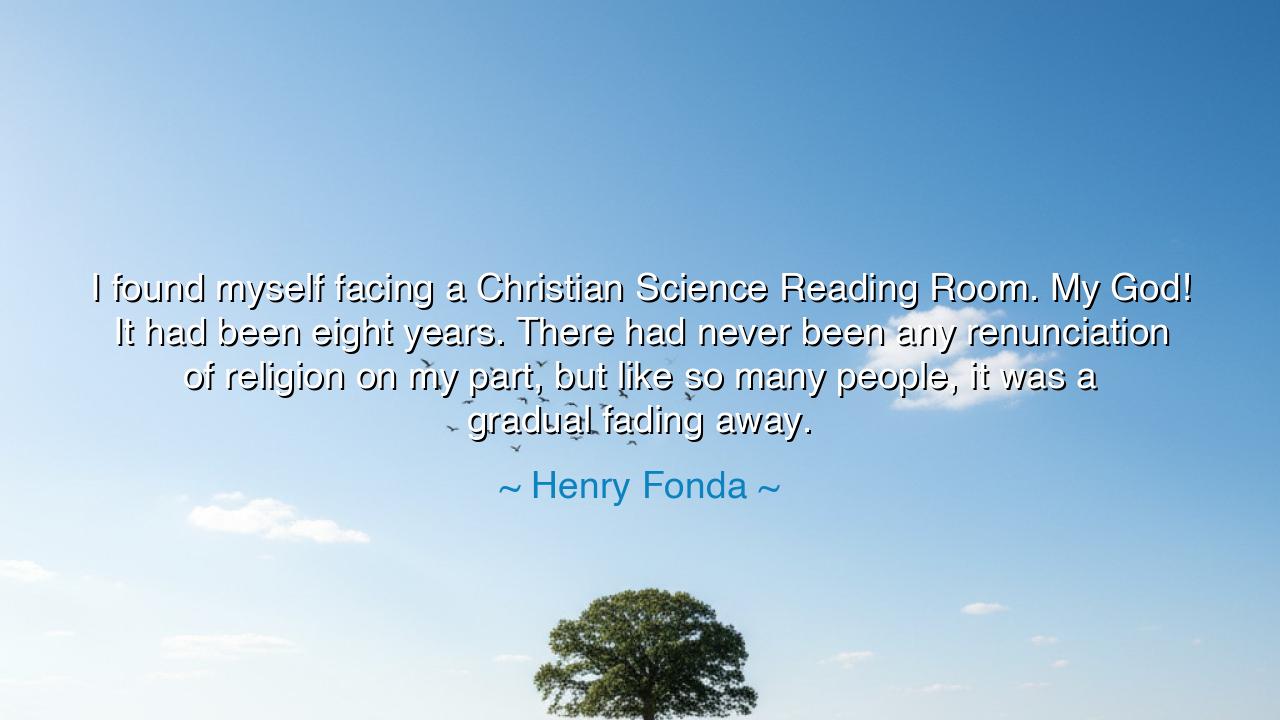
I found myself facing a Christian Science Reading Room. My God!
I found myself facing a Christian Science Reading Room. My God! It had been eight years. There had never been any renunciation of religion on my part, but like so many people, it was a gradual fading away.






“I found myself facing a Christian Science Reading Room. My God! It had been eight years. There had never been any renunciation of religion on my part, but like so many people, it was a gradual fading away.” Thus spoke Henry Fonda, the great American actor whose quiet strength on screen mirrored the inward struggles of his soul. In this confession lies no rebellion, no anger, but the ache of realization—the recognition of something lost not in a single moment, but across the slow erosion of time. Fonda’s words echo the experience of countless souls across the centuries: the fading of faith, not through denial, but through distance; not through rejection, but through forgetting. It is the still, sorrowful truth that many who once walked with certainty one day awaken to find that certainty gone, replaced by silence.
To understand his words is to see that the loss of faith is rarely an explosion—it is a quiet dimming, like the setting of a sun no one noticed until darkness had already fallen. Fonda does not curse religion, nor does he mock it. Instead, he stands in awe and grief before the memory of what once gave him light. The Christian Science Reading Room, a symbol of belief and sanctuary, becomes a mirror, reflecting to him the years in which his spirit slowly wandered away. It was not an act of betrayal, but of drifting—a gradual forgetting of sacred things amidst the noise of life, the way one forgets the voice of a loved one long absent.
The ancients understood this fading well. They spoke of it not as sin, but as the sleep of the soul. For in the chaos of existence—its work, its pain, its endless demands—man often turns his eyes from heaven simply to endure the world. The mystics called it “the long forgetfulness,” that season of life in which one no longer prays, not out of disbelief, but from exhaustion. Yet within this fading there remains a spark, for one cannot mourn the absence of something that was never loved. Fonda’s exclamation—“My God!”—is not blasphemy but yearning, proof that the divine still whispers even in absence.
There is a story told of Leo Tolstoy, who in the midst of his fame and fortune found himself overwhelmed by despair. Though he had achieved everything the world could offer, his soul grew hollow, his faith long neglected. In that emptiness, he realized that he had not rejected God—he had simply ceased to remember Him. And when at last he fell to his knees, the forgotten flame rekindled, burning quietly once more. Like Fonda, he discovered that belief does not die in a moment—it only wanders, waiting to be found again. The divine is patient; it does not demand, it invites.
Yet Fonda’s words also speak to the age in which he lived—a world that, like ours, was becoming louder, faster, more self-assured. In such an age, faith becomes a whisper, easily drowned by progress and pride. People no longer renounce belief with anger; they simply drift into indifference. The temples remain, but the worshipers do not. Religion, once a wellspring of awe, becomes a relic, and men forget that faith is not merely doctrine, but nourishment for the spirit. Fonda’s lament, then, is not only personal—it is prophetic. He stands as a mirror for a generation who did not abandon God, but simply walked too far to hear His voice.
And yet, there is hope even in this confession. For to realize one’s distance is already the first step toward return. When Fonda says, “It had been eight years,” there is no arrogance in his tone—only recognition, and perhaps a faint longing. It is as if the soul, startled awake after a long sleep, looks around and whispers, “I remember this light.” The gradual fading away need not end in darkness; it can be the prelude to rediscovery. The divine does not vanish because we forget—it waits, quietly, like an old friend, at the corner of memory, ready to be greeted once more.
So, my child of the restless world, let this wisdom take root in your heart: guard against the slow erosion of the sacred. Faith—whether in God, in love, or in meaning—is not lost through rejection, but through neglect. Water it with wonder, speak to it in gratitude, and do not let the demands of the day rob you of the silence of the soul. If ever you find yourself, like Fonda, standing before the symbol of what you once believed, do not turn away in shame or despair. Stand still, remember, and listen—for even in absence, faith speaks softly, saying, “I am still here.”
For this is the final truth: the divine does not require your perfection, only your remembrance. You may wander for years, you may fade without noticing, but the moment you look back, the light returns. Life will always pull the spirit toward forgetfulness, but the heart that dares to remember—ah, that heart will never be truly lost.






AAdministratorAdministrator
Welcome, honored guests. Please leave a comment, we will respond soon